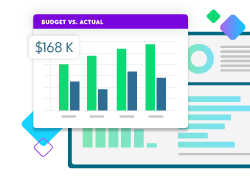How Finance Can Partner with Program for Nonprofit Audit Success

There is a sense of accomplishment that comes with a good deep cleaning. You get rid of all of the miscellaneous junk that accumulates over the years. Everything is organized and easy to find. But there is a reason why these cathartic cleaning sessions happen once or twice a year—they take a lot of work.
In the same way that a good clean-out of your garage helps you put everything back where it should be, your annual nonprofit audit helps you organize your financials. But much of the time, with the budget constraints and tight staffing nonprofit organizations experience, your annual nonprofit audit can become more like an event to survive than a helpful organizational opportunity.
While your nonprofit financial team owns and manages the audit process, there are ways to share the work with other parts of your organization, such as your Program team. By partnering with Program, they can understand the importance of the audit, help you fill in any gaps, and have a better, more informed conversation with your auditors.
Why Should Finance Partner with Program for Nonprofit Audits?
Most nonprofit financial teams do a good job with the basics. Your monthly close runs well. You have open items, but you know what they are, and make a point to get to them—if they are material. So then, why is an audit so much work?
When expenses aren’t submitted correctly, internal controls aren’t always followed, and deadlines get pushed back, it creates more work to find, fix, and remind. But rarely are those errors made out of malice—the Program department has other priorities, and they may not understand the effects of submitting an expense to the wrong GL.
With any complex or extensive project like a nonprofit audit, it helps to have your entire team aligned so you create momentum throughout the organization—instead of inadvertently throwing roadblocks or making more work for the other team.
Align With Your Program Team on Objectives—Audit and Otherwise
Finance is a service department, but you are also the guardian of regulated and limited funds. Given your expertise, it makes sense for Finance to lead the initiative for a successful partnership with your Program team.
Share outcomes with the Program team regularly so they can see how the different initiatives are performing. Together, the two departments can ensure that resources are available to meet and exceed program goals. If Program understands that our primary objective is to ensure that our programs are here for generations to come, then they may come to appreciate our cautiousness.
But remember, your Program team isn’t well-versed in accounting speak, so make sure you avoid finance jargon. Tailor your reports and outcome presentations to the Program audience and speak to their specific goals to get their buy-in.
With the annual financial audit, make sure a member of the Program team is on the audit committee and is aware of timelines. Help them communicate to the rest of the Program team why the audit is important and how their work impacts the audit success. You might even find a way to gamify cooperation, or at least provide regular recognition of team members who comply with deadlines and internal controls.
Create Regular Communication Between Departments
Commit to an open and ongoing dialogue. And assume the best. Find ways to interact both formally, such as bi-monthly meeting, and informally, such volunteering events or a Wordle Slack channel. Use the formal meetings to explain your internal controls and why they are important—maybe pick one to cover each time—but also be open to feedback. There might be a good reason why your Program Manager can’t submit expenses within the allotted time, and together you can make adjustments.
Also have Program provide updates to Finance on the different initiatives they are working on, what’s going well, and where there might be setbacks. This can help you have a more informed conversation with your auditors.
At the end of the day, your entire organization shares one overarching goal: to meet and exceed program objectives within the available resources.
Make Your Nonprofit Audit Easier with Cooperation from Program
You may ask, “How does that relate to the nonprofit audit?” Targeting risks and measuring performance and compliance should be a shared responsibility for everyone at your organization, including Program and Finance. Otherwise, it’s like dragging a mule up a hill in the hot sun.
It may be easier in the short term to simply fix the expense errors, but when you explain the value of the processes and how they help you achieve your mission, your Program team will want to support you. Be willing to meet them halfway and make a fair ask of Program to meet these compliance requirements with tools that simplify the process.
Want to learn more about preparing for a successful audit? Check out Your Survival Guide to Annual Nonprofit Financial Audits.
Fund Accounting Software that Drives Impact
Find out how Blackbaud’s Financial Edge NXT® fits your organization.




